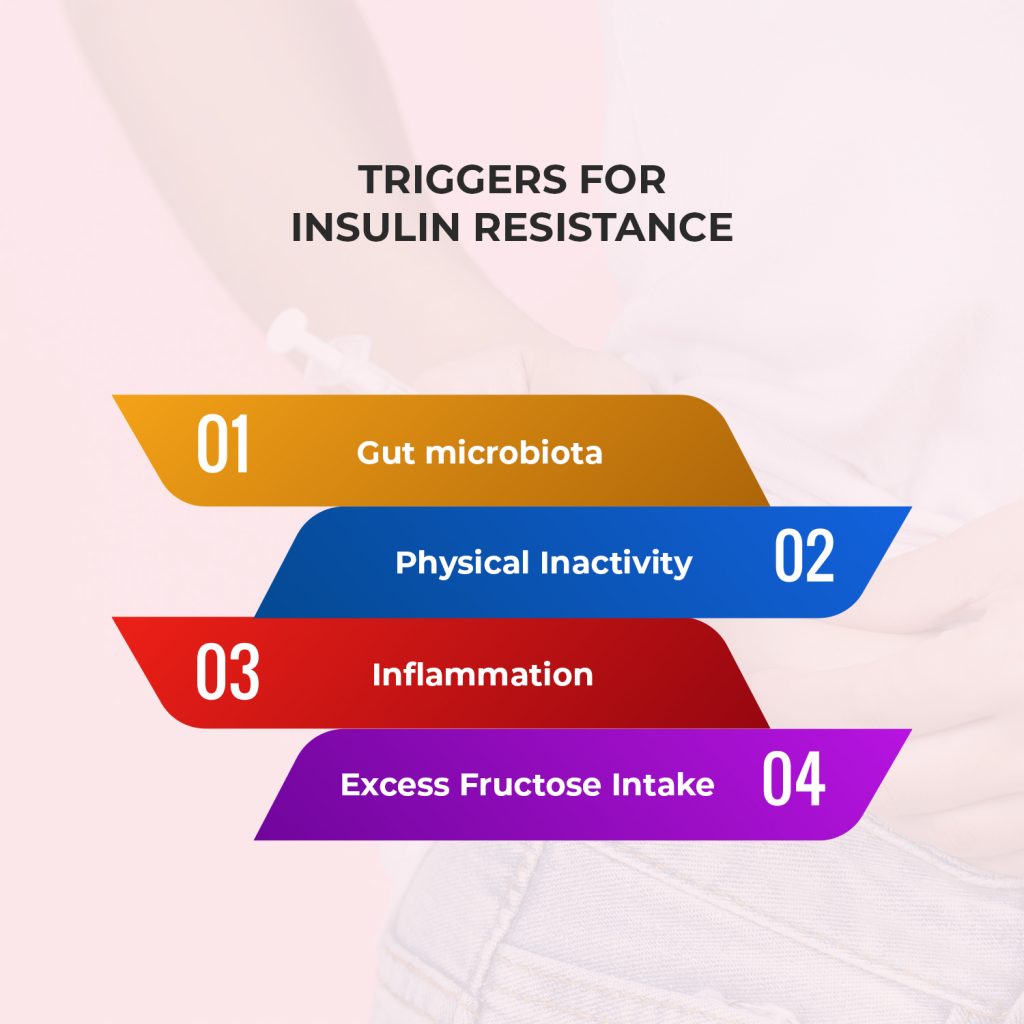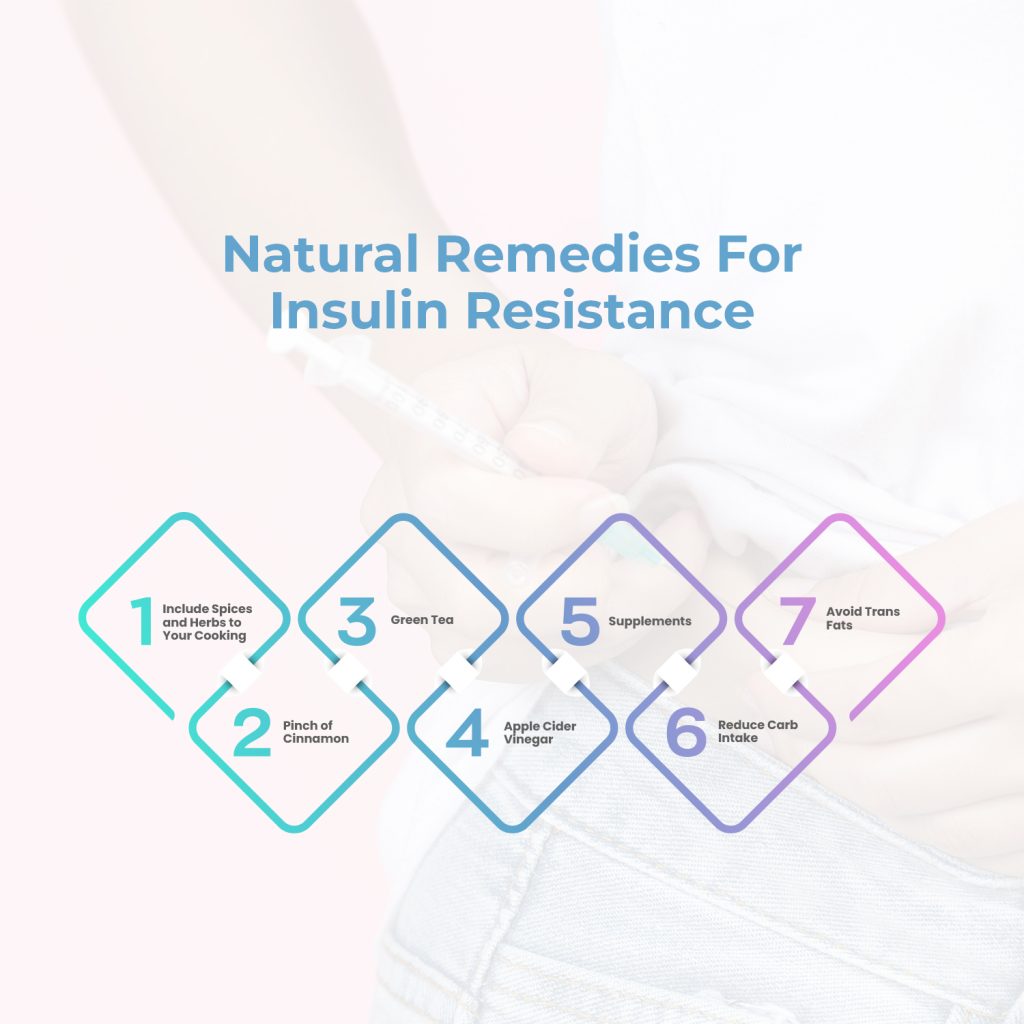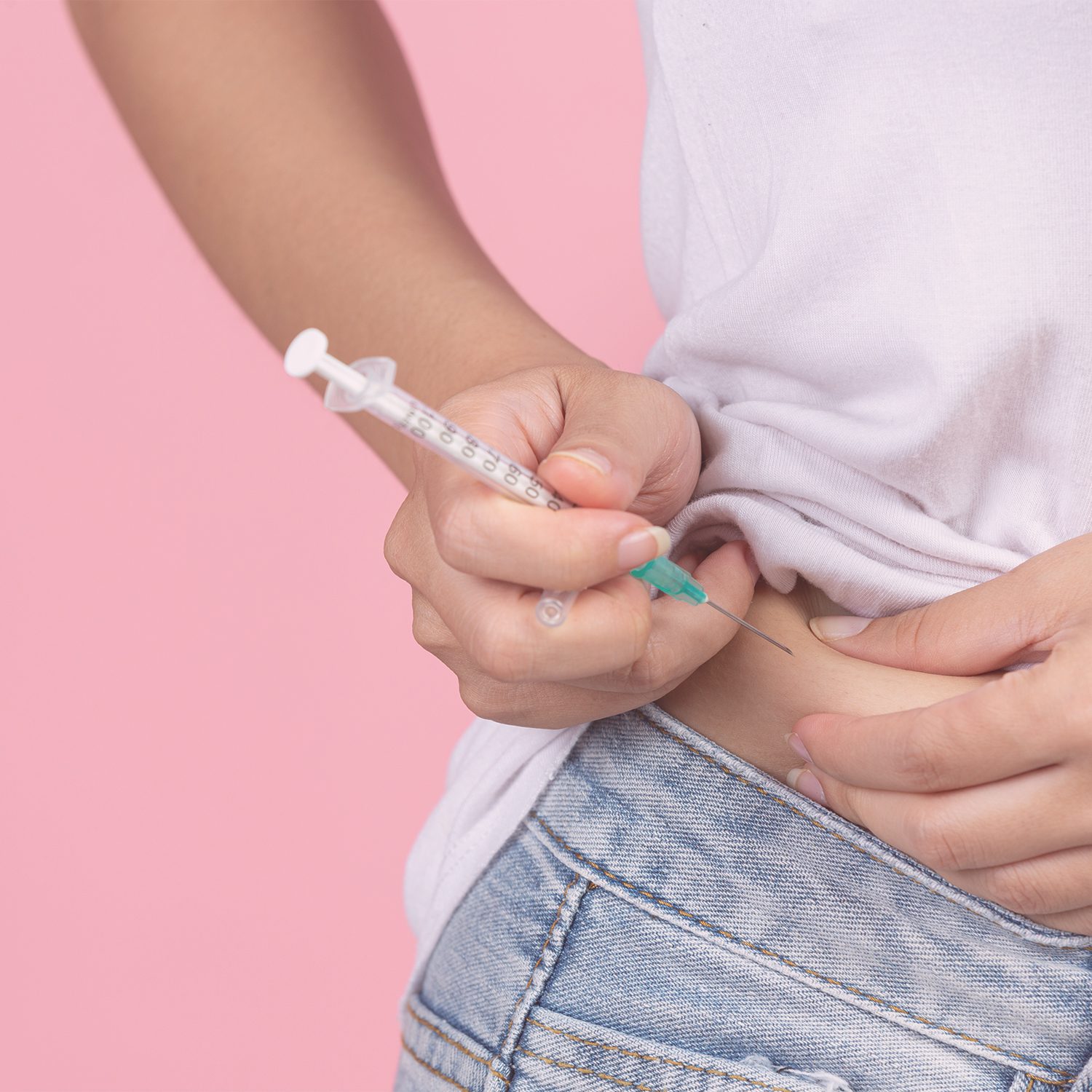Insulin resistance affects more than 32.2 percent of the United States population, increasing the risk of diabetes. It is possible to have insulin resistance for many years without even knowing it simply because it has no noticeable symptoms. Due to this situation, it is essential to regularly check your blood sugar levels and consult your doctor about the best treatments. However, you can battle this condition with natural remedies for insulin resistance.
Table of Contents
You will learn the following from this post:
Meaning of Insulin Resistance
This condition occurs when the cells in your liver, fat, and muscles stop responding to insulin and cannot use glucose from your blood for energy. As a result, the pancreas produces more insulin, causing high blood sugar levels to make up for this.
People with high cholesterol, high blood pressure (hypertension), obesity, and a sedentary life supported by a diet high in refined carbs and processed sugar tend to be more susceptible to insulin resistance.
When the glucose in the bloodstream is too much, insulin begins to knock on the cell’s door frequently. Eventually, the cell gets frustrated and completely locks the door, resisting insulin’s attempt to enter. As a result, that cell has become insulin resistant, which is a problem because it does not get the necessary energy while glucose moves in the bloodstream freely.
When insulin resistance occurs, it can lead to many illnesses, such as diabetes and heart disease. In addition, the negative effect of insulin resistance takes place over a long period. For example, insulin resistance can remain active before developing type 2 diabetes for 10 to 15 years. To avoid the long-term adverse effect of insulin resistance, you must identify and address the causes of the condition as early as possible. You can also begin treating it with natural remedies for insulin resistance.
Symptoms of Insulin Resistance
You cannot be entirely sure that you have insulin resistance without running the necessary blood tests. Insulin resistance symptoms are not as noticeable as you might expect, but the following are signs that may indicate its presence:
- Acanthosis Nigerian: patches of dark, velvety skin, usually on the groin, armpit, and neck
- Skin tags
- HDL (“good cholesterol”) levels not up to 50 mg/dL in women and 40 mg/dL in men
- Fasting triglyceride levels above 150 mg/dL
- Fasting glucose levels above 100 mg/dL
- Blood pressure reading that goes beyond 130/80
- A waistline of more than 35 inches in women and 40 in men
When you notice any of these in the tests you carry out, you should begin to incorporate the natural remedies for insulin resistance as soon as possible.
Causes of Insulin Resistance

Various factors can be responsible for insulin resistance, and one of them can be elevated fat levels in your blood. The primary cause of increased fat levels is usually a diet high in processed foods, trans fats, and calories, which frequently leads to sudden weight gain, overeating, and obesity.
Excess body weight may trigger increased visceral fats – these are dangerous belly fats that accumulate around your organs. The fats are responsible for releasing many fatty acids into your blood, including inflammatory hormones that trigger insulin resistance.
Insulin resistance is often a result of unhealthy lifestyle habits, which reflect in:
- Gut microbiota: Studies have shown that a disruption in your gut’s bacterial environment may lead to inflammation that provokes insulin resistance and other health-related problems.
- Physical inactivity: Sedentary lifestyle and a lack of physical activity may result in insulin resistance.
- Inflammation: Existing inflammation in your organs and increased stress levels are strongly associated with the cell’s inability to respond to insulin.
- Excess fructose intake: Frequent and excess fructose intake originating from added sugars may trigger the onset of insulin resistance.
As already explained, obesity is the primary cause of insulin resistance. Abdominal obesity is even worse because it aggravates insulin resistance. Besides being overweight, other common causes of insulin resistance include:
- Smoking
- Lack of sleep
- Being sedentary
- Poor diet
Symptoms of Insulin Resistance in Females
Women suffering from any hormone imbalance (such as polycystic ovary syndrome – PCOS) are at a greater risk of developing insulin resistance since their bodies cannot respond to insulin as quickly as they should.
Women with polycystic ovary syndrome are at more risk of developing insulin resistance if they are above 40, have high blood pressure, have high cholesterol, are mostly inactive, and are overweight. Over time, they may be craving salty and sweet foods, tingling sensation in their hands and feet, frequent urination, fatigue, increased hunger or thirst, or similar signs which prove they are resistant to insulin.
Polycystic Ovary Syndrome
PCOS – Polycystic Ovary Syndrome is a hormonal disorder that occurs in women in their reproductive age. It results from prolonged menstrual periods and the growth of small follicles of fluid on the ovaries. If left untreated, polycystic ovary syndrome may trigger severe complications, such as various chronic cardiovascular diseases, abnormal triglyceride, and cholesterol levels, type 2 diabetes, pregnancy-induced high blood pressure, miscarriage, and infertility.
Diagnosing Insulin Resistance
Your doctor will make employ several methods to find out if you are insulin resistant or not. Blood tests are the most accurate indicator of the condition. The blood tests can show high triglycerides, fasting insulin levels, and low cholesterol levels also called HDL (high-density lipoprotein) cholesterol.
Once the doctor diagnoses you with insulin resistance, you will have to work with a licensed specialist to find the most effective and efficient insulin resistance treatment to reduce your risk of diabetes or any other severe health condition. You can talk to your specialist about which to follow among the natural remedies for insulin resistance.
7 Natural Remedies for Insulin Resistance

You are more susceptible to insulin resistance if you have a family history of type 2 diabetes or prediabetes. Improving your insulin sensitivity will help reduce your insulin resistance and risk of many other diseases, such as diabetes. Consider the following natural remedies for insulin resistance:
1. Include Spices and Herbs in Your Cooking
Spices and herbs have medicinal properties, and people used them for treatments long before they incorporated these medicines into cooking. It was about a few decades ago that scientists began to identify their health-promoting properties. For example, spices and herbs, including garlic, ginger, turmeric, and fenugreek, have been promising in increasing insulin sensitivity.
- Fenugreek seeds. They have a high content of soluble fiber, which makes insulin a lot more effective. Eating fenugreek as an extract or baking it in bread helps increase insulin sensitivity and manage blood sugar.
- Turmeric. This particular spice contains curcumin, an active component with potent anti-inflammatory and antioxidant properties. In addition, turmeric helps increase insulin sensitivity by decreasing the sugar levels of fatty acids in the body.
- Ginger. This is a pretty popular spice that has been around for a very long time. One of its medicinal properties is increasing insulin sensitivity. The research discovered that gingerol (an active component of ginger) makes sugar receptors on muscle cells a lot more available, thereby increasing sugar uptake.
- Garlic. This spice has antioxidant properties that make it improve insulin secretion and increase insulin sensitivity.
2. Pinch of Cinnamon
Cinnamon is a popular and tasty spice with various plant compounds. It also can increase insulin sensitivity and reduce blood sugar. For instance, an analysis found that consuming about to 3 teaspoons of cinnamon each day will significantly decrease short- and long-term blood sugar levels. Further research suggests that cinnamon improves insulin sensitivity by helping receptors for glucose on muscle cells become more efficient and available for transporting sugar into the cells. Another interesting study revealed that cinnamon has some compounds that can mimic and act directly on cells.
3. Green Tea
Even if you are not suffering from insulin resistance, green tea is a beautiful beverage for overall health. People who have diabetes (or those at risk of it) should consume more green tea. Green tea can reduce blood sugar and increase insulin sensitivity. The beneficial effects of this tea may be due to its potent antioxidant epigallocatechin gallate (EGCG), which is capable of increasing insulin sensitivity.
4. Apple Cider Vinegar
You can use vinegar for several things because it is a versatile liquid. You can use it to clean or use it as a food ingredient. It is also excellent in apple cider vinegar, a trendy beverage in the community of natural health. Vinegar is capable of increasing insulin sensitivity by reducing blood sugar levels. It also can delay the stomach and keep it from releasing food into the intestines, allowing the body more time to absorb sugar into the bloodstream. Apple cider vinegar increases insulin sensitivity by 34 percent during a high carbohydrate meal in people originally insulin resistant. It increases sensitivity by 19 percent in people who have type 2 diabetes.
5. Supplements
Taking natural supplements to increase insulin sensitivity is a relatively new concept. Various supplements may improve insulin sensitivity, but resveratrol, magnesium, berberine, and chromium seem to be the best.
- Resveratrol appears in the skin of red grapes and various other berries, and it contains a component called polyphenol. This supplement may increase insulin sensitivity, especially in those who have type 2 diabetes.
- Berberine is extracted from various herbs, such as the plant Berberis. No one knows the effects of this plant molecule on insulin, but studies reveal that it increases insulin sensitivity and lowers blood sugar levels.
- Magnesium is a mineral that helps insulin receptors store blood sugar. Research revealed that low blood magnesium is one of the causes of insulin resistance. Therefore, taking magnesium will significantly help increase insulin sensitivity.
- Chromium is a mineral involved in fat and carb metabolism. Therefore, taking chromium picolinate supplements in 200 to 1000 mcg doses could increase insulin receptors’ ability to lower blood sugar.
As with all supplements, they may interact with your current medication. Therefore, before using any of them, it is best to discuss your options with your doctor.
6. Reduce Carb Intake
Carbs are the primary stimulus that increases insulin blood levels. When the body changes carbs to sugar and releases it into the bloodstream, the pancreas releases insulin to transport sugar from the blood into the cells. You can increase your insulin sensitivity by reducing your carb intake. Diets high in carbs can lead to a spike in blood sugar, which puts more pressure on the pancreas to get rid of sugar from the blood.
Another way of increasing your insulin sensitivity is by spreading your carb intake evenly throughout the day. By eating smaller portions of carbs throughout the day, you will be providing your body with less sugar at each meal, easing the job of insulin.
The type of carb you settle for is also quite important. The best carbs are the low-glycemic index (GI) because they slow down the release of sugar in the blood, allowing insulin to work more efficiently. Carb sources with low GI include quinoa, brown rice, sweet potatoes, and some variety of oatmeal.
7. Avoid Trans Fats
It would help if you tried to remove artificial trans fats altogether from your diet. Unlike other fats, trans fats provide no health benefits whatsoever. Instead, they increase the risk of many diseases. In addition, high trans-fat intake may result in poor insulin resistance and blood sugar management.
Foods that contain trans fats include donuts, pies, and fried fast foods. In addition, you can find artificial trans fats in more processed foods. In the year 2015, the Food and Drug Administration (FDA) considered trans fats unsafe to consume. The administration gave food manufacturers three years to apply for special approval or gradually eliminate trans fats from their food products.
Final Thoughts
It would be best if you considered trying some of the natural remedies for insulin resistance already provided in this post so that you can increase your insulin sensitivity and reduce your risk of diseases associated with the resistance. However, you must talk with a healthcare specialist before adding supplements to your treatment regimen. Preventing insulin resistance is one of the most powerful ways to live a healthier and longer life. Start improving your condition with simple lifestyle measures, such as exercising, eating healthy foods, and losing fats.
Post Disclaimer
The information contained in this post "7 Natural Remedies for Insulin Resistance" is for educational purposes only. Always consult your primary care doctor before using the remedies that are provided. The information is provided by The Hidden Cures and while we do timely, in-depth research on the information that we provide to you, everything stated may not be up to date or accurate from the time it was written.
